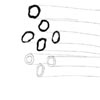Bosetti/Vowinckel, "Charlemagne, La Vue Attachée Sur Son Lac De Constance, Amoureux De L'√¢bime Caché"
 Here's another gem of miniature electro acoustics from Bowindo, the Italian label that, within only a few years of activity, has become a bright beacon on the Mediterranean front, producing a modest string of thoroughly uncompromising releases, all of which will be featured on the Brain in coming weeks.Bowindo
Here's another gem of miniature electro acoustics from Bowindo, the Italian label that, within only a few years of activity, has become a bright beacon on the Mediterranean front, producing a modest string of thoroughly uncompromising releases, all of which will be featured on the Brain in coming weeks.Bowindo
Bowindo 03 is an uneven split dominated by two tracks from Alessandro Bosetti who will be better known for his challenging sax-playing as a contemporary of John Butcher and Bhob Rainey, working in a similar strained style of ultra-dry landscaping and small, human-scaled tensions. His first piece, the 18-min. "Sardinia and Japan are Islands," however, does not offer the sun-kissed change of pace that its title might suggest. Though expansive, even "breezy" sounds such as wind chimes and bird calls do find their way into the mix, Bosetti's islands could be just as easily represented using ink dots on a blank page. The piece is a bizarre trip over chemical waters, adrift on sharp pure tones and the odd analog crackle with enough extended silences to keep the mood cool and detached. No saxophone will enter at all, the only organic sounds limited to faraway thumping (barrels afloat, knocking?), the ghostly chimes, and some abrasive voice sampling, a section of which includes a text listing island names.
While there doesn't seem to be much of an internal logic behind this work, its drift is quite effective in creating feelings of discomfort that seem vaguely oceanic, a paralyzed-at-sea, Ancient Mariner-type vibe for sure. An interesting comparison could be Nurse With Wound's Salt Marie Celeste, music that works towards a similar effect but through different means. Bosetti's other contribution, the 22 min. "Kitchen Piece," likewise is not the sort of embracive or heartwarming creation expected from, say, Yoko Ono if she'd chosen the cooking area as a setting for one of her many "pieces." Sourced using sounds from an in-kitchen improv by labelmates Guiseppe Ielasi and Renato Rinaldi, the track is, at first, a monster of crudely cut-up noise sounding like average dish-clatter folded over-and-over on top of itself. Just as brutal are the quick stops and starts of Bosetti's cuts, the interjections more damaging each time, allowed little release in the piece's long and slow descent towards the chorus of layered pure tones and murky static that forms its conclusion.
The third and final track belongs to German experimental dramatist Antje Vowinckel, and, at barely half the length of the other two, it feels a bit unnecessary, though certain comparisons exist, especially in the stunted, silence-ful pacing carrying over from Bosetti's works. Hers, however, suffers from a sound palette that feels too varied for its own good, allowing only cryptic referencing to be made and causing the certain bold, even humorous inclusions (like sped-up martial arts grunting) to clash broadly with any kind of mood emerging elsewhere. The Bosetti pieces, however, were not such easy sells either, and the fact that they feel as strong after several listens gives hope that this disc might prove more well-rounded upon future consideration.
samples:



